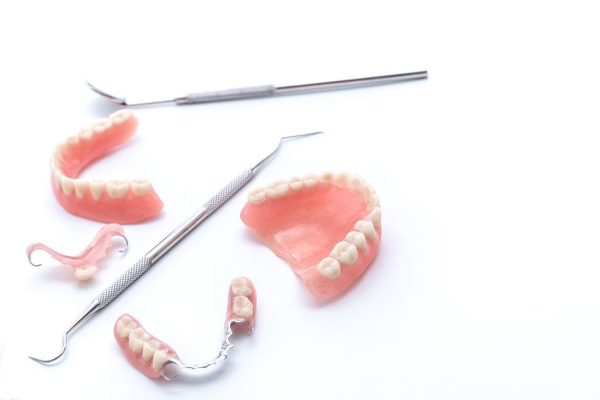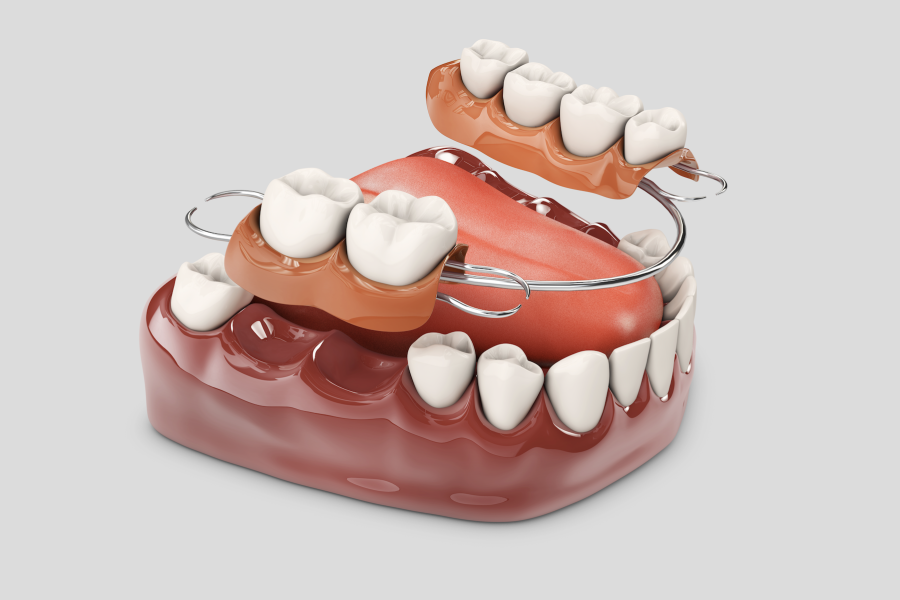
How many types of dentures are there?
There are two types of dentures: fixed and removable. They differ in terms of strength, cost, and usability. Dentists will recommend the best and most suitable option for each patient, depending on their preferences. The decision on which type of denture to use ultimately lies with the patient.
1. Removable dentures come in two types: dentures with a plastic base and dentures with a metal base.
2. Fixed dentures come in two types: dental bridges and dental implants.
Removable dentures
Removable dentures involve the creation of artificial teeth that are attached to our natural teeth and can be taken out for cleaning. Removable dentures can be made for the entire mouth or specific areas to replace missing teeth, depending on each individual’s oral condition. Our clinic offers removable denture services using two materials: plastic base and metal base.

| Price | Price: Affordable | Higher cost compared to plastic material |
| Count of Visits to dentist | 2 – 4 times | 3 – 5 times |
| Price per Tooth (Starting)” | approximate 2,500 Baht | approximate 15,000 Baht |
The advantages of removable dentures
The disadvantages of removable dentures
Things to know and practices after wearing dentures.
- It is advisable to brush both natural teeth and dentures after each meal.
- Avoid wearing dentures while sleeping to allow the gums to rest and prevent the risk of gum inflammation.
- Refrain from using dentures that have front biting surfaces or are designed for chewing food, as this may cause the dentures to come loose easily. It is recommended to avoid using natural teeth in their place.
- Avoid consuming excessively hard and sticky foods.
- Store dentures by placing them in a container prepared for soaking dentures. Ensure that there is enough water to cover the dentures, and soaking them in water helps prevent them from drying out, warping, or losing their shape.
- If you experience pain or encounter any issues after wearing dentures, such as soreness, discomfort, or excessive tightness, it is advisable to promptly consult the dentist who provided the dentures for a check-up and necessary adjustments.
- Schedule regular dental check-ups every six months to monitor oral health and the condition of the dentures.
- Every time dentures are removed, it is recommended to place them in a container with water and a liner while not in use. This helps prevent potential issues in case the dentures slip from the hands, as they would land in the container rather than impacting a hard surface.
- It is advised to undergo denture procedures with a dentist specializing in denture work. Be cautious of advertisements promoting low-cost dentures without proper expertise from a qualified dentist.
- When dentures are not in use, store them by soaking in a denture-soaking solution or plain water. Avoid leaving them exposed to the air outside, as this may lead to distortion or warping of the dentures.
Fixed denture
Permanent dentures that adhere to our natural adjacent teeth or gums. This includes the fabrication of crowns, dental bridges, and artificial tooth roots.
Comparing the prices of fixed dentures
| Price | Price per unit for dental crowns, including the desired gap for tooth insertion. | Maximum price per tooth when compared to other types of dental prosthetics. |
| Count of Visits to dentist | 3 – 4 times | 6 – 8 times |
| Price per Tooth (Starting)” | Approximately | Approximately 55,000 Baht, on average. |
Advantages of Fixed Dentures
Disadvantages of Fixed denture
Different types of fixed dentures

Dental Crown
Dental crown are considered a restoration and protection for teeth that have been damaged due to breakage or teeth that have undergone root canal treatment. They can serve as replacements for actual teeth or reinforce the strength of existing teeth. Dentists typically create crowns for specific teeth using various materials, which may include pure metals, all-ceramic materials, or a combination of metal and ceramic (PFM) to ensure both strength and aesthetic appeal. The purpose of crowning a tooth is to maintain its original shape and functionality, ensuring a tight fit and allowing for color adjustments to match the natural shade of adjacent teeth.
Who Is a Suitable Candidate for Dental Crowns?
- In the case of front tooth crowns, emphasis is often placed on aesthetics.
- For back teeth or molar crowns, the focus is on functionality for chewing, considering factors such as having a large number of molars and the characteristics of molars, which are wide in size. Teeth with multiple cavities may not be treatable with fillings.
- Individuals with cracked or loose teeth should consider treatment with crowns to preserve and extend the functionality of the teeth.
- Those who have undergone root canal treatment before, due to the fragility of the tooth structure, may opt for crowns.
- Dental crowns also aid in adjusting the alignment of teeth in cases where teeth are misaligned due to accidents, fractures, or discoloration, resulting in an unattractive appearance similar to adjacent incisors.
Dental bridge
What is a Dental Bridge?
- Creating a type of fixed prosthetic tooth to replace a missing tooth.
- The fundamental principle of a dental bridge relies on using natural teeth on either side to anchor it, and it cannot be removed independently.
- The shape of a dental bridge resembles natural teeth, without clasps or fake gum plates.
- Dental bridges are typically done when a tooth is extracted, but natural adjacent teeth remain strong enough to serve as anchors for the bridge.

Who is suitable for dental bridges?
- Individuals who have lost consecutive teeth, ranging from 1 to 3 teeth, may benefit from getting dental bridges. However, determining whether dental bridges are suitable for you or not requires a detailed examination of your dental condition, gum health, bone structure, and your medical history.
- To successfully undergo the dental bridge procedure, you should have good oral health with no periodontal disease or gum inflammation. If you have gum issues, you may need treatment before proceeding with the dental bridge procedure.
- If you wish to have a traditional dental bridge (non-implant-supported), the foundation teeth for the bridge must be sufficiently strong to support the crown part of the bridge after some enamel has been removed.
- For dental bridges combined with implant-supported roots, you must have a jawbone with enough density to accommodate the dental implant roots. If the bone density is insufficient, you may need bone grafting or alternative treatment options.
- The best way to determine if dental bridges are suitable for you is to schedule an appointment with us for a thorough examination of your remaining teeth. Afterward, your dentist can provide guidance on the most suitable tooth replacement options for you and address any questions you may have.
Dental bridge on implants

The Difference Between Dental Implants and Bridges
There are considerations between a dental bridge on natural teeth and a dental bridge on implant roots.
For a dental bridge on natural teeth, the advantage is that it can be completed quickly, often within a few days. It is relatively strong and easy to care for. However, the drawback is that it requires the preparation of the natural adjacent teeth as the primary support for the bridge. Additionally, it has to withstand increased chewing forces, which may lead to weakness and potential additional tooth loss in the long run.
On the flip side, a dental bridge on implant roots can be done in any area without relying on natural teeth as the primary support. The implant roots, typically made of metal, are strong, stable, and do not involve additional tooth preparation. They can withstand significant chewing forces and function similarly to a bridge on natural teeth. However, the downside is that the treatment process is more time-consuming, taking at least two months for the artificial tooth roots to fully integrate with the jawbone before placing the dental bridge on the implant roots.
Dental implants
Dental implant roots at Punnakan Dental Clinic come in two systems: OSSTEM and Straumann.
Dental Implant for Individual Teeth
Dental implants are artificial tooth roots made to replace natural tooth roots. They are crafted from titanium, a material that is specially designed to integrate well with the human body. These implants can be embedded into the jawbone to anchor them securely, particularly for patients experiencing issues with their natural tooth roots. This helps provide a firm foundation for dental prosthetics such as individual artificial teeth, crowns, or bridges, yielding results that closely resemble natural teeth.

Dental implants are the best artificial teeth closely resembling natural teeth. They provide a secure fit, eliminating the need for removal. Over time, dental implants integrate with the bone, becoming a seamless part of the jaw. Currently, dental implants are considered the most effective and comprehensive solution, albeit with a potentially higher cost. When compared to their long lifespan, the investment is often deemed highly worthwhile.
Stabilizing Existing Dentures with Dental Implants
Placing artificial roots to support dentures:
As conventional dentures rely on the gum ridge for support, changes in the gum ridge can lead to deterioration of the denture fit. Utilizing dental implant roots as anchors for denture frameworks provides stability to the dentures, boosting confidence for the wearer. This method can be applied to both upper and lower jaws in dentistry.
Benefits of placing artificial roots to support dentures:
- Provides better stability and support compared to traditional dentures.
- Facilitates easier and clearer speech and conversation.
- Eliminates concerns about dentures becoming loose or slipping.
- Allows for an increased variety of food choices, although caution is still needed with hard or difficult-to-chew foods as they may damage the dentures.
- Offers a more natural feeling than conventional dentures since there is no coverage over the gum ridge or palate. They can also be removable.
- Dentists can modify and use the existing denture of the patient if suitable.
- The treatment is less expensive than placing artificial roots to support a full dental bridge.
Compilation of Dental Implant Cases at Punnakan Dental Clinic
Part of an Example: Dental Implant Case



Things to Know and Do After Dental Implant Surgery
- Take care of the wound after dental implant surgery. Patients should bite down on the gauze firmly for approximately 1 hour and then spit it out. If there is still bleeding, bite on a clean gauze for another hour.
- If bleeding persists, avoid sucking on ice. Instead, use ice packs wrapped outside the mouth or on the surgical area.
- Avoid rinsing or using any mouthwash in the first day after dental implant surgery as it may disturb the blood clot and cause further bleeding. Subsequently, gentle rinsing with saltwater (1 glass of warm water mixed with 1 teaspoon of salt) is recommended, especially after eating.
- You can brush your teeth and clean your mouth as usual, but be cautious during the initial period not to disturb the surgical wound.
- If you experience pain, you can take pain relievers such as paracetamol, usually 1-2 tablets per dose. If the pain persists, take another dose, ensuring a 4-hour interval from the previous intake.
- Avoid drinking alcohol or any intoxicating beverages, as it may lead to additional bleeding after the initial bleeding has stopped. Also, refrain from smoking.
- Consume soft and easily digestible foods, such as yogurt, rice porridge, and various soups.
- If there is swelling or any abnormal symptoms, it is advisable to revisit the dentist for further examination.
Fixed vs. removable dentures
Service rates and payment installments
Contact us at Poonnakan Dental Clinic,
Dentist Consultation.






